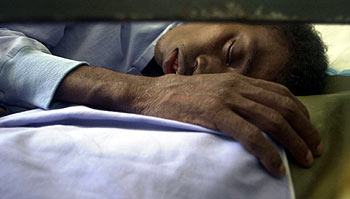|
|
||||||
| |
 |
|
IF GEORGE BUSH spent more time and money on mobilising Weapons of Mass Salvation (WMS) in addition to combating Weapons of Mass Destruction (WMD), we might actually get somewhere in making this planet a safer and more hospitable home. WMD can kill millions and their spread to dangerous hands needs to be opposed resolutely. WMS, in contrast, are the arsenal of life-saving vaccines, medicines and health interventions, emergency food aid and farming technologies that could avert literally millions of deaths each year in the wars against epidemic disease, drought and famine. Yet while the Bush administration is prepared to spend $100 billion to rid Iraq of WMD, it has been unwilling to spend more than 0.2% of that sum ($200m) this year on the Global Fund to Fight AIDS, Tuberculosis and Malaria.
Roosevelt talked not only about Freedom from Fear but also Freedom from Want |
The great leaders of the second world war alliance, Franklin Roosevelt and Winston Churchill, understood the twin sides of destruction and salvation. Their war aims were not only to defeat fascism, but to create a world of shared prosperity. Roosevelt talked not only about Freedom from Fear but also Freedom from Want. One of the reasons why the Bush administration is losing the battle for the world's hearts and minds is precisely that it fights only the war on terror, while turning a cold and steely eye away from the millions dying of hunger and disease. When is the last time anybody heard Vice-President Dick Cheney even feign a word of concern for the world's poor?
Last month Mr Bush made a speech to the General Assembly of the United Nations. In calling for action against Iraq, he challenged the international community to live up to its own words. “We want the United Nations to be effective, and respectful, and successful. We want the resolutions of the world's most important multilateral body to be enforced.” He asked whether “the United Nations will serve the purpose of its founding, or will be irrelevant?” The idea that UN commitments should be followed by action is indeed a radical one, especially for the United States, where wilful neglect of its own commitments is the rule.
When is the last time anybody heard Vice-President Dick Cheney even feign a word of concern for the world's poor? |
Just one week before Mr Bush's UN speech, at the Johannesburg World Summit on Sustainable Development, the rich countries promised to put real resources behind the “Millennium Development Goals” of cutting poverty, disease and environmental degradation. They agreed (the United States among them) to “urge the developed countries that have not done so to make concrete efforts towards the target of 0.7% of GNP as ODA [official development assistance] to developing countries.” The United States falls $60 billion a year short of that target—a seemingly unbridgeable gap, until one realises that the annual military spending in America has risen by about that amount since Mr Bush entered the White House. The United States spends just 0.1% of GNP on foreign assistance. It is firmly in last place among the 22 donor countries in aid as a share of income, a position it will continue to hold even after the small increases the administration announced earlier this year.
If we were to send teams of “UN development inspectors” into the United States, the results would not be pretty. First, they would discover a nearly total disconnect between global commitments and domestic politics. Mr Bush has not discussed America's commitments at Johannesburg with the American people (and perhaps his aides have not even discussed them with the president).
Second, they would find complete disarray with regard to the organisation, budgeting, and staffing necessary to fulfil the commitments. White House and State Department foreign-policy experts are overwhelmingly directed towards military and diplomatic issues, not development issues. Senior development specialists in the Treasury can be counted on one hand. America's government is not even aware of the gap between its commitments and action, because almost nobody in authority understands the actions that would be needed to meet the commitments.
No serious work whatever is under way within the government to link annual budgetary allocations with the international development goals the United States has endorsed. For example, the Bush administration has failed to produce even one credible document spelling out America's role in a global-scale war against AIDS.
America's planned contribution to the global AIDS fund is around a sixth of what is needed in 2003, according to the fund itself. The evidence shows that $25 billion a year from the donors could avert around 8m deaths each year. The expected $100 billion cost of war against Iraq would therefore be enough to avert around 30m premature deaths from disease, if channelled into a sustained and organised partnership with the poor countries.
There is a way out. It is to empower the United Nations to do what it can truly do: organise a global response to the global challenges of disease control, hunger, lack of schooling and environmental destruction, an effort in which the United States would be a major participant and indeed financier, in exactly the manner that it has repeatedly pledged.
The idea that the UN system could provide real leadership on the great development challenges will strain credulity in some quarters. A steady drumbeat of criticism about the UN agencies during the 1990s, led by right-wing leaders in Congress, has left the impression of nearly moribund institutions, busy securing patronage slots for friends and relatives, and disconnected from the rapid advances in technology, finance and globalisation. Indeed, when I began my own intensive work with the UN agencies three years ago, as chairman of a commission for the World Health Organisation, and then more recently as a special adviser to the secretary-general for the Millennium Development Goals, I was unsure what to expect within the specialised agencies of the United Nations.
The truth is almost the opposite of what the UN bashers say. Despite a decade of criticism and budget cuts, the specialised UN agencies have far more expertise and hands-on experience than any other organisations in the world. Even the World Bank, with its knowledge base and ability to disburse and monitor funds in some of the most difficult settings in the world, can address problems of health or environment or other specialised concerns only in partnership with UN agencies that have expertise in these specific areas. No bilateral donor agency can substitute for the scale of UN expertise and engagement, though these agencies can be important partners in a global effort.
No bilateral donor agency can substitute for the scale of UN expertise and engagement |
This under-appreciated capacity is why the UN system has vastly outperformed expectations in Kosovo, East Timor and other tough assignments in recent years. An agency like the World Health Organisation has a unique mix of technical expertise, legitimacy in all corners of the world, and especially an operational presence on the ground in dozens of the world's poorest and neediest countries. Agencies such as the Food and Agriculture Organisation in Rome became objects of merriment and ridicule among right-wing congressmen in recent years—but of course the constituencies of those senators and congressmen never had to battle the loss of fisheries in Tonle Sap Lake in Cambodia, or drought in AIDS-ravaged southern Africa, as the FAO does each day.
The United Nations, in conjunction with the World Bank, should be asked to take the lead in establishing “Global Frameworks of Action” surrounding each of the major development goals. These frameworks would outline, in broad terms, yet with budgetary guidelines and timetables attached, the specific ways in which rich- and poor-country governments, the private sector, philanthropic foundations and other parts of civil society could get organised to win the fight against poverty and disease. Realistic plans would be based on four Ss: scale, science, specificity, selectivity.
First, the UN plans should address each issue at the appropriate scale. Just as there is no point in having weapons inspectors visit only a small fraction of possible weapons sites, there must be no faking it with small-scale AIDS projects that might save one village while leaving whole nations to die. But true scale will cost money, especially from the United States.
Second, the UN should mobilise the best science available, as it has done with climate change in the IPCC or with health at the World Health Organisation and UNAIDS. This means an open, inclusive and consultative process in each area of concern, drawing upon national and international scientific academies, public and private research centres, and academia.
It is time for Mr Bush to take seriously his own statementthat “our commitment to human dignity is challenged by persistent poverty and raging disease” |
Third, any plan of action must recognise the specificity of conditions on the ground. There is no single strategy for fighting AIDS, or preserving forests or combating malaria. Everything depends on physical geography, culture, history and other very local factors. The best way by far to bridge global science and local conditions is to invite national governments and civil society in each country to prepare their own plans of action, with the understanding that meritorious programmes will be funded at the international level. That is the strategy of the Global Environment Facility and the Global Fund to Fight AIDS, Tuberculosis and Malaria. It should be the strategy behind similar efforts for expanding primary education, or providing water and sanitation to impoverished regions.
Fourth, any plan must be selective, addressing donor assistance only towards regions that will use it well, and taking a hard-headed approach when corrupt governments are likely to squander the help. On this, the United States is right to demand that aid be linked to good governance and reasonable economic policies. The fallacy in America's approach has been that even well-behaved governments receive only a tiny fraction of the financial help that they really need.
Our interconnectedness on the planet is the dominating truth of the 21st century. One stark result is that the world's poor live, and especially die, with the awareness that the United States is doing little to mobilise the weapons of mass salvation that could offer them survival, dignity and eventually the escape from poverty.
It is time for Mr Bush to take seriously his own statement at the UN that “our commitment to human dignity is challenged by persistent poverty and raging disease.” If Mr Bush would only lead his country to that end, not only would he mobilise billions of people in the fight against terrorism, but he would also fulfil his own call for the world to “show that the promise of the United Nations can be fulfilled in our time.”
 |
|
Jeffrey Sachs is the director of the Earth Institute at Columbia University in New York. He has served as an adviser to many poor-country governments and was formerly head of the Harvard Centre for International Development. He is one of the world's foremost authorities on development.
|
Copyright © 2002 The Economist Newspaper and The Economist Group. All rights reserved. |